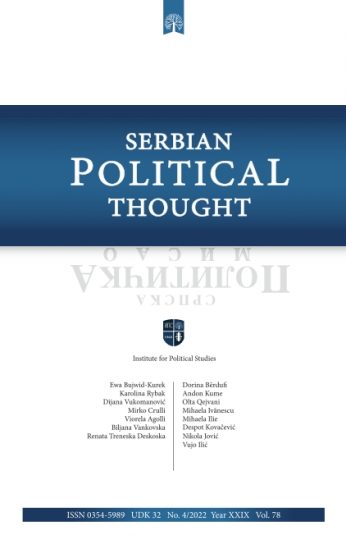Main topic
spt2/2013
The Social Choice Theory: Can it be Considered a Complete Political Theory?
Abstract
Social choice theory (SCT) deals with the aggregation of individual preferences in order to arrive at social preference orders, i.e. at the ‘general will’. The present paper examines whether SCT could be regarded as a complete political theory. SCT is evaluated against seven criteria, proposed by Martha Nussbaum, that a political theory needs to fulfill in order to be regarded a complete political theory. These criteria are: understanding of material need; procedural justice; liberty and its worth; racial, ethnic and religious differences; gender and family; international relations; and moral psychology. The analysis showed that SCT is strong at problems of procedural justification, distributive justice and some problems of ethics. It is weaker on the issues of moral psychology, and justice between nations. It is neglectful concerning the issues of racial, ethnic and religious inequality, and issues of gender and family. The paper concludes that the SCT can have an important place within more comprehensive political theories, but cannot claim itself to be a complete political theory.
References
- Arrow, K. (1950) Social Choice and Individual Values. New York: John Wiley & Sons.
- Craven, J. (1992): Social Choice: A Framework for Collective Decisions and Individual Judgements. Cambridge: Cambridge University press.
- Elster, J. (1986) “The Market and the Forum: three Varieties of Political theory”. In: Elster, J. and Hylland, A. (eds.) Foundations of Social Choice Theory. Cambridge: Cambridge University Press. pp. 103-132.
- Elster, J. and Hylland, A. (eds.) (1986): Foundations of Social Choice Theory. Cambridge: Cambridge University Press.
- Elster, J. (1989) Solomonic Judgements: Studies in the limitations of Rationality. Cambridge: Cambridge University Press.
- Gibbard, A. (1973) “Manipulation of Voting Schemes: A General Result”, Econometrica: 587-601.
- Hammond, P. J. (1995) “Social Choice of Individual and Group Rights”. In Barnett, W. A. et al. (eds.) Social Choice, Welfare, and Ethics. Cambridge: Cambridge University Press. pp. 55-77.
- Harsanyi, J. (1955) “Cardinal Welfare, Individualistic Ethics, and Interpersonal Comparison of Utility”, Journal of Political Economy, 63: 309-321.
- Harsanyi, J. (1965) ”Game Theory and the Analysis of International Conflicts”, Australian Journal of Politics and History, 11(3): 292-304.
- Harsanyi, J. (1969) “Rational-Choice Models of Political Behavior vs. Functionalist and Conformist Theories”, World Politics, 21(4) 1969: 513-538.
- Harsanyi, J. (1975) “Can the Maximin Principle Serve as a Basis for Morality? A Critique of John Rawls’ Theory”. In J. Harsanyi, Essays on Ethics, Social Behavior and Scientific Explanation. Dordrecht: Reidel. pp. 35-63.
- Harsanyi, J. (1977) “Morality and the Theory of Rational Behavior”, Social Research, 44(4): 623-656.
- Held, D. (ed.) (1991): “Introduction” to Political Theory Today. Stanford: Stanford University Press.
- Lalman, D. et al. (1993) “Formal Rational Choice Theory: A Cumulative Science of Politics”. In: Finifter, A. W. (ed.) Political Science: The State of the Discipline II. Washington, APSA. pp. 77-104.
- McLean, I. (1991) “Forms of Representation and Systems of Voting”. In: Held, D. (ed.) Political Theory Today. Stanford: Stanford University Press. pp. 172-196.
- Mouzelis, N. (1995): Sociological Theory: What Went Wrong? Diagnosis and Remedies, Routledge, London.
- Nussbaum, M. (1997) “Is Nietzsche a Political Thinker?”, International Journal of Philosophical Studies, 5(1) 1-13.
- Rawls, J. (1958) “Justice as Fairness”, Philosophical Review, 67(2): 164-194.
- Roemer, J. E. (1986) “An Historical Materialist Alternative to Welfarism”. In: Elster, J. and Hylland, A. (eds.) Foundations of Social Choice Theory. Cambridge: Cambridge University Press. pp. 133-164.
- Rowley, C. K. (1993) Social Choice Theory. Volumes I to III, Hunt: Edward Elgar.
- Sen, A (1970) “The Impossibility of a Paretian Liberal”, Journal of Political Economy, 78(1): 152-157.
- Sen, A. (1977) “Weights and Measures: Informational Constraints in Social Welfare Analysis”, Econometrica, 45(7): 1539-1572.
- Sen, A. (1983) “Liberty and Social Choice”, The Journal of Philosophy, LXXX(1): 5-28.
- Sen, A. (1986) “Foundations of social choice theory: an epilogue”. In: Elster, J. and Hylland, A. (eds.) Foundations of Social Choice Theory. Cambridge: Cambridge University Press. pp. 213-248.
- Sen, A. (1995) “Rationality and Social Choice”, The American Economic Review, 85(1): 1-24.
- Sen, A. (1999) “The possibility of social choice”, The American Economic Review, 89(3): 349-378.
- Tideman, N. T. and Tullock, G. (1976) “A New Superior Process for Making Social Choices”, Journal of Political Economy, 84(6): 1145-1159.

